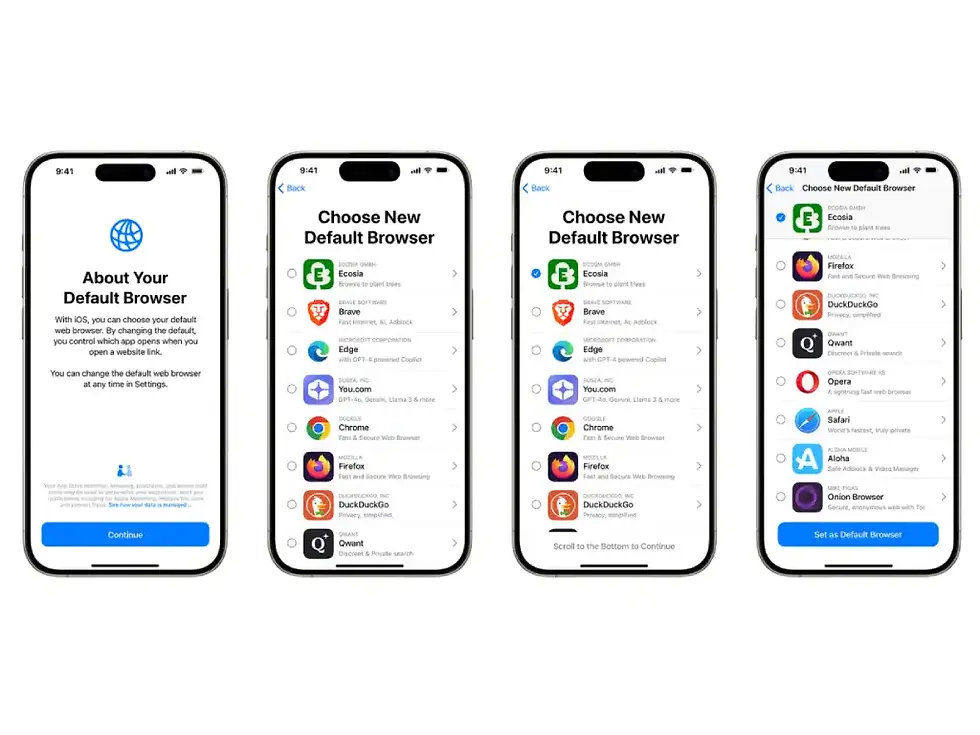
Photo Credit: Apple
As Apple Inc. (AAPL.O) navigates the intricate landscape of regulatory compliance, the European Union's Digital Markets Act (DMA) has prompted significant modifications in how Apple offers browser and app choices to its users. These changes are not merely cosmetic; they represent a profound shift in Apple's strategy to maintain its foothold in the highly competitive and increasingly regulated European market.
A New Era of Browser Choice: The “Browser Choice Screen”
The Digital Markets Act, effective from March 7, 2024, mandates that major digital platforms, such as Apple, provide users with an array of choices when it comes to selecting default applications, including web browsers. Apple’s response to this legislative pressure is the introduction of a “choice screen” that users will encounter upon opening Safari for the first time.
What Is the Browser Choice Screen?
The browser choice screen is a pivotal element in Apple's strategy to comply with the DMA. This screen will present users with a randomized list of 12 browsers available in their respective EU country, each accompanied by a succinct description. This selection process is designed to be straightforward, allowing users to choose their preferred browser, which will then be automatically downloaded and set as the default.
The choice screen will be accessible not only on iPhones but also on iPads, following an update scheduled for later this year. This feature aims to enhance user autonomy in selecting third-party browsers, a significant shift from Apple’s traditionally closed ecosystem.
The Regulatory Push and Apple's Response
Apple's previous attempts to comply with the DMA were met with criticism from browser companies, leading to an investigation by the European Commission. The Commission’s concerns centered on whether Apple’s initial measures were sufficiently robust to meet the DMA’s objectives. In light of this, Apple has been in continuous dialogue with the Commission, culminating in the development of the updated choice screen.
Andrew Frost Moroz, founder of Aloha browser, welcomed Apple's revised approach, emphasizing that it not only aligns with regulatory expectations but also enhances the user experience by reducing the steps required to start browsing. The streamlined process is expected to benefit third-party browsers, leveling the playing field in a market long dominated by Apple’s proprietary software.
Expanding User Control: Default Apps and Deletable Apple Applications
In addition to the browser choice screen, Apple is introducing a dedicated section within its settings for managing default applications. This feature will enable users to set defaults for essential functions such as messaging, phone calls, spam filters, password managers, and keyboards. The introduction of this section marks a significant departure from Apple's previous approach, which offered limited flexibility in app customization.
Deletable Apps: A Move Toward Greater User Freedom
Perhaps the most noteworthy change is Apple’s decision to allow users to delete certain pre-installed Apple-made apps. This includes major applications such as the App Store, Messages, Camera, Photos, and Safari. The only exceptions are the Settings and Phone apps, which remain non-deletable due to their integral role in the device’s functionality.
This move is expected to resonate positively with users who have long expressed frustration over the inability to remove apps that they do not use but are nonetheless integral to the iOS ecosystem. By offering this level of customization, Apple is demonstrating a willingness to adapt to user demands and regulatory requirements, further solidifying its commitment to the European market.
Implications for Apple and the Broader Tech Industry
Apple’s compliance with the DMA sets a precedent for other tech giants operating within the EU. The introduction of the choice screen and the ability to delete pre-installed apps are clear indicators of a shift towards greater transparency and user empowerment. As the European Commission continues to monitor the effectiveness of these measures, other companies may find themselves compelled to adopt similar practices to avoid regulatory scrutiny.
The Future of App and Browser Markets in the EU
The changes brought about by the DMA and Apple’s subsequent compliance are likely to have far-reaching effects on the app and browser markets in the EU. By providing users with more choices and greater control over their devices, the DMA is fostering a more competitive environment that could lead to increased innovation and diversity in app and browser offerings.
As Apple continues to navigate this new regulatory landscape, the company’s ability to balance compliance with its core business model will be crucial. The introduction of these new features is a testament to Apple’s adaptability and its commitment to maintaining its position as a leading player in the global tech industry.
Source: Apple
Comentários